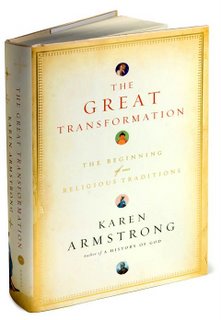 Karen Armstrong has a new book out titled, The Great Transformation: The Beginning of our Religious Traditions. Armstrong, who is noted for both her scholasticism and storytelling abilities, takes the reader on a readable review of the birth of the major religious traditions that still exist today.
Karen Armstrong has a new book out titled, The Great Transformation: The Beginning of our Religious Traditions. Armstrong, who is noted for both her scholasticism and storytelling abilities, takes the reader on a readable review of the birth of the major religious traditions that still exist today.Or, at least, that is what the review I just read said. I am going out to buy the book this afternoon.
Almost as impressive as the recommendation for Armstrong's book is the review itself of the book. You can read a portion of that below. At the end of the article, I'll provide a link to the full review.
*********
The Great Transformation provides the reader with a way of isolating each of the major religions of the world and seeing how each tradition found its own way of addressing its individual challenges while still remaining wedded to a moral ideal that each expressed in terms of its own history and symbolic tradition. There is no attempt in the book to elide the complications and the difficulties that the innovators faced in their time. Figures like the Hebrew prophets; the Buddha and Confucius and their heirs; the Greek philosophers and tragedians; all rose in the context of crisis and conflict. The age was one of unrelenting war and bloodshed, of great and deep injustices and struggles. Their words and ideas were articulated in societies that often sought to reject them. As time went by, the innovations and the radicalism of these thinkers was, as Armstrong has already noted for us, co-opted by the mainstream and diluted – sometimes to the point of reversing the moral center of gravity demanded in the texts and pronouncements of these traditions.
In our Modern age we have seen an attempt to sublimate religious ideas and traditions with the concomitant result of finding resurgent and often intolerant forms of religion emerge in ways that have led to ever more violence and dysfunction. In spite of the attempts of humanists and academic scholars to lay out the historical context of Axial Age thought, the innate prejudices of the Modern against the values of the mythical and the spiritual, values that are often trumped in favor of the scientific and the technological, very frequently removes the moral aspects of our religious heritage from the current discourse on values.

No comments:
Post a Comment